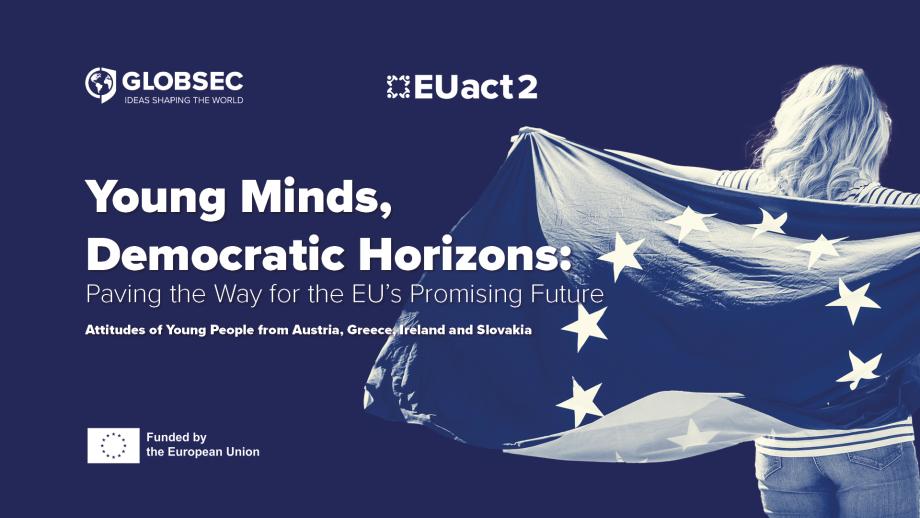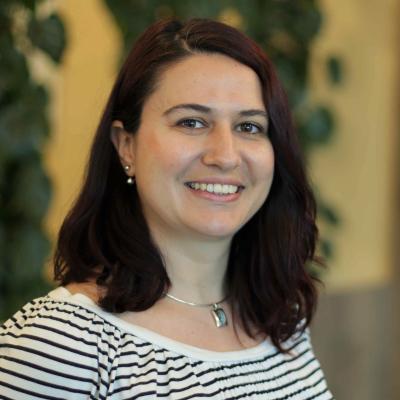Young Minds, Democratic Horizons: Paving the Way for the EU’s Promising Future Attitudes of Young People from Austria, Greece, Ireland and Slovakia

Young people in Europe value democracy, doubt that their voices are represented in their countries and in the EU but carry a positive outlook for their European future, although with caveats.
These are some of the findings from conducting 13 focus groups with young people living in Austria, Greece, Ireland and Slovakia. The work is part of an ongoing GLOBSEC European project titled EUact2, in partnership with Hellenic Foundation for European and Foreign Policy (ELIAMEP), European Movement Ireland and Institute for the Danube Region and Central Europe (IDM).
This publication provides insight into the perceptions of young people with respect to democracy, democratic forms of participation, citizen activism and the future of the EU. As they are potential new leaders who will contribute to crafting EU society in the future, it is important to glean the voices of young Europeans to evaluate current strategies and policies. It is also necessary to assess the need to enact changes and/or create new tools to more impactfully and consistently engage young people. Now less than a year away from the next European Parliament (EP) elections, gauging citizen attitudes can provide a foundation for understanding possible trends regarding European (dis)integration developments in the near future.
KEY FINDINGS
THE MEANING OF DEMOCRACY IS BROADLY UNDERSTOOD AMONG YOUNG PEOPLE
Young people highly value democracy and see it as intertwined with freedom, equality, and the feeling of genuine representation, sometimes using these terms interchangeably.
DESPITE ITS NUMEROUS FLAWS, DEMOCRACY IS (STILL) THE PREFERRED CHOICE OF YOUNG PEOPLE
Young people cannot imagine living in any political regime type other than democracy. Though they acknowledge there is considerable space for improvement, they are resolute that democracy still offers more strengths than weaknesses.
EUROPEAN DEMOCRACY FROM A SAFETY NET TO NOT ON THE RADAR
While young people are able to discuss their perceptions regarding democracy in their own countries at ease, for most, European democracy is less well understood. Yet, young people in Greece see the EU, buoyed by its institutional design and legal framework, as a safety net and a protector for democracy even though it is not without flaws (e.g. Qatargate, lack of inclusion of young people, and its slow-paced and onerous bureaucracy).
EU CITIZENS ARE (STILL) CONFUSED ABOUT THE EU AND DO NOT BELIEVE IN THE POWER OF EU PARLIAMENT ELECTIONS
The belief that the EU decision-making process is too complex and difficult for the public to grasp continues to resonate among EU citizens. Sceptical views towards the power of the European Parliament are especially worrisome; young people see parliamentarians not as the primary decision-makers but rather playing second fiddle to ‘closed-door deals’ made at the Council.
MEMBERS OF THE EUROPEAN PARLIAMENT COULD DO THEIR JOB BETTER
Young people stress that Members of the European Parliament (MEPs) can do better. They are calling for more stringent conditions to become a candidate and they are suggesting improved outreach with constituencies and clarity regarding who MEPs represent. Young EU citizens are supportive of some structural changes.
YOUNG PEOPLE DO NOT FEEL REPRESENTED BUT SEE THEMSELVES AS ACTIVELY ENGAGED CITIZENS
The youth population continues to feel detached from political processes and hold the impression that they are not considered important enough to be represented. Most young people see themselves as actively engaged citizens, though they stress that voting in elections is the main channel through which they practice this activism.
THE ALTERNATIVES TO REPRESENTATIVE DEMOCRACY ARE STILL RATHER UNKNOWN
The ability to distinguish between representative, participatory and deliberative forms of democracy poses a broad challenge to young people. Irish youth are most familiar and outspoken on the benefits of deliberative formats.
THE CONFERENCE ON THE FUTURE OF EUROPE WAS A GOOD, THOUGH FLAWED, EXERCISE
Most young people aware about the Conference on the Future of Europe (CoFoE) appreciate the ambitious effort that was made. However, there is considerable space for improvement including by introducing an element of permanency into the format to enable it to yield a tangible policy impact over time.
BRUSSELS (STILL) APPEARS TO BE TOO FAR AWAY FROM EVERY CORNER OF THE UNION
The perception that the EU’s decisions are made in distant Brussels and that smaller Member States are not sufficiently visible and represented at the EU level is still predominant. This sentiment traverses East and West, with young people from Ireland to Slovakia sharing similar attitudes.
THE FUTURE OF THE EU WILL BE BRIGHT BUT MUCH NEEDS TO BE DONE
Young people are generally optimistic about the future of the EU and consider it to currently provide the best option available for multidimensional cooperation between European countries. They see the EU, over the next 20 years, as becoming more integrated in some areas and continuing to enlarge. Caveats in this optimistic outlook exist in ensuring that the Union is not destabilised from internal and external pressures which would increase the risk for disintegration.
THE EU SHOULD CONTINUE DEEPENING INTEGRATION ACROSS VARIOUS FIELDS
While young people do not foresee a federation of European countries on the horizon, they are confident that EU citizens will significantly benefit from further integration in several policy areas: at the economic dimension, strengthening the Common Foreign and Security Policy (CFSP), relaunching the EU enlargement policy, tackling common migration policy, reaching climate neutrality.
THE EU NEEDS TO BE MORE TRANSPARENT AND EXERT A MORE ASSERTIVE HAND AGAINST DEMOCRATIC BACKSLIDING
Young people are willing to surrender some national autonomy in the future and instead embrace a move towards a more multispeed type of integration. Yet, they demand increased transparency from the EU, a more balanced power relationship between institutions and improved accessibility for citizens.
Read more in the report below.
Funded by the European Union. Views and opinions expressed are however those of the author(s) only and do not necessarily reflect those of the European Union or European Education and Culture Executive Agency (EACEA). Neither the European Union nor the granting authority can be held responsible for them.

